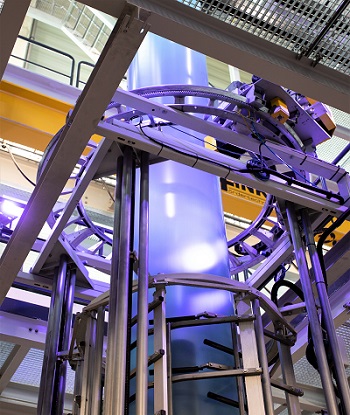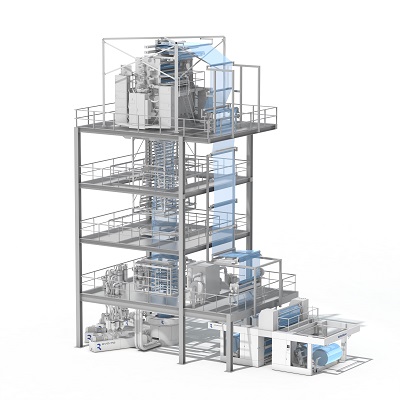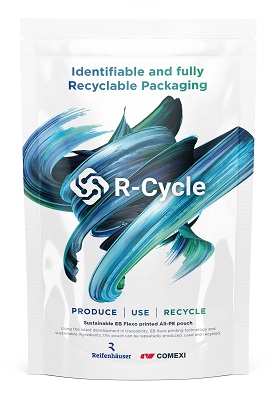At GREENPLAST 2022 congress trade fair held in Milan on 3-6 May 2022, Reifenhäuser Blown Film showcased technical solutions for the economical and sustainable production of blown film that pay off in terms of a functioning circular economy and reduction of the carbon footprint. Highlights include the patented EVO Ultra Stretch production process for fully recyclable All-PE Blown Film, the use of digital product passports in the interests of a functioning circular economy, and technologies for the economical processing of post-consumer and post-industrial recyclate. Reifenhäuser thus showcased examples of future-proof technologies that are consistently designed for the production of sustainable products.
Recyclable packaging achieved through EVO Ultra Stretch
EVO Ultra Stretch, Reifenhäuser's patented stretching unit, enables the production of mono-material composites (All-PE Film) for fully recyclable flexible packaging in which the otherwise usual PET layer of the packaging is replaced by stretched PE. This is made possible by the maximum 10-fold stretch rate, which gives PE films completely new mechanical properties.
There is no need to adapt further processing steps such as printing, laminating and converting. Thanks to the patented position of the stretching unit directly in the haul-off of the blown film line, the film is stretched at the ideal time and from first heat, which at the same time makes the process particularly user-friendly, stable and efficient.

Reifenhäuser EVO Ultra Fusion
Sascha Skora, senior sales manager at Reifenhäuser Blown Film, explains: "We supply our customers with production lines that enable them to now use the sustainability shift as an opportunity to become a preferred supplier for new, recycling-friendly products that serve the environment and business success."
Lowest-quality recyclate processing with EVO Ultra Fusion
High recyclate content in packaging is just as important as recycling-friendly design of plastic products. However, manufacturers face new technical challenges in processing recyclates: The highly fluctuating quality of the input material is one of the biggest problems. With the Reifenhäuser EVO Ultra Fusion extrusion process, blown film producers make themselves less dependent on the input quality and can also dispense with the energy- and cost-intensive regranulation of the recycling material. Fluff (film shreds) as well as all types of production waste and PCR material can thus also be extruded directly. Ultra Fusion processes even the lowest quality recyclates, which were previously out of the question for the blown film process, into functional films for applications such as trash or mailing bags. This is made possible by twin-screw technology, for a better melt homogenization, which ensures a stable process. Processors can also degas the system very easily and effectively, removing unwanted ingredients in the recyclate.

Reifenhäuser EVO Ultra Stretch
For processing better quality regranulates, Reifenhäuser recommends the already well-known EVO Extruder in the 33L/D variant. Thanks to optimised barrier as well as shear and mixing parts, this extruder processes recycled material as reliably and naturally as other raw materials - the ideal prerequisite for success in the growing market for products with a high recycled content.
Digital product passport enables circular economy
To make the best use of the potential of fully recyclable packaging for the circular economy, Reifenhäuser relies on digital product passports via R-Cycle - the traceability standard for plastic packaging. At Greenplast, Reifenhäuser featured a fully recyclable ALL-PE pouch equipped with this technology.
R-Cycle automatically stores recycling-relevant information during production and makes it available as a standardised data record for the waste sorting process. This enables data-based and thus more precise sorting for high-quality recycling. Production machines along the entire value chain can thus record relevant data, such as the type of plastic, printing ink, adhesive, additives and also the use of the packaging (food / non-food), and make this information available on the end product via appropriate marking (e.g. digital watermarks).
R-Cycle was developed to market maturity by various technology companies and organisations along the entire life cycle of plastic packaging. Founded in 2020, R-Cycle is a cross-company initiative to develop an open and globally applicable tracing standard for sustainable plastic packaging. The aim is to automatically record recycling-relevant packaging properties during production by providing a digital product passport and to pass them on through the value chain. This prepares the technical basis for more precise waste sorting and higher-quality recycling to drive an effective circular economy. With this, recyclable packaging can then be identified in the recycling process via special markings and fed into pure waste fractions. This is the key to obtaining high-quality recyclates to close the loop.

Technologically, R-Cycle is based on GS1 standards. GS1 is the leading global network for cross-industry process development and is also a founding member of R-Cycle. By providing a digital product passport, all recycling-relevant data is automatically recorded during the production of plastic packaging and made accessible via appropriate markings (e.g. digital watermarks or QR codes) on intermediate and end products. This enables waste sorting plants to accurately identify packaging and form recycling-friendly as well as single-variety fractions. This is the basis for obtaining high-quality recyclates to build a functioning circular economy.
R-Cycle is already operational and has been successfully tested in a number of pilot projects. Under the umbrella of GS1 Germany, a project has also been launched based on R-Cycle to develop the GS1 guideline PDS4CircularPlastics (Processes and data sharing approach for enabling circular plastics value networks). This again underlines the approach of the companies involved to establish R-Cycle as an industry standard.
Reifenhäuser is a founding member of the cross-industry community R-Cycle which starts into a new phase as an open community that held its first official general assembly on 3 May 2022 at R-Cycle member Multivac’s corporate site in Wolfertschwenden, Germany. Right at the start of the community, the circle has grown by 6 more companies to now a total of 19 members. The community offers access to a broad network of application-experienced partners and know-how in digitalisation and sustainability. In addition to the general assembly at management level, the exchange takes place via specialised working groups that deal specifically with the various application areas of digital product passports. The R-Cycle platform can be networked with all common software systems as well as a wide variety of production equipment. The traceability technology behind R-Cycle is based on GS1 standards – the leading global network for cross-industry process development and a founding member of R-Cycle. In addition to improving product sustainability, manufacturers and processors of plastic packaging also benefit in terms of process efficiency, quality and compliance with legal information requirements.
In addition to effectively improving product sustainability, manufacturers and converters of plastic packaging will also benefit in terms of process efficiency, quality and compliance with legal information requirements. Systems and machines networked with the R-Cycle data platform can obtain precise information on the respective upstream products from the digital product passport and supplement their own data accordingly, which represents added value for customers in the downstream process.
- This article also appears in the International Plastics News for Asia - June issue. To read the e-zine, click here.

 iConnectHub
iConnectHub
 Login/Register
Login/Register Supplier Login
Supplier Login


























